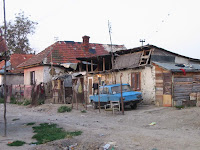FROM AMNESTY INTERNATIONAL USA
Serbia must end forced evictions of Roma
10 June 2010
"[They told me], 'Get on the bus if you want, but if you're against it, you're in the street'. Everything was flying from all sides, in came the trucks. My children were there, gathered around my legs, screaming; what could I tell them?" Maya, evicted from the Gazela Bridge settlement
Amnesty International on Thursday called on the Serbian government and Belgrade authorities to stop the forced eviction of Roma from informal settlements in the Serbian capital.
Amnesty International's briefing paper, Serbia: Stop the forced evictions of Roma settlements, documents the forced eviction of 178 families from a settlement under the Gazela Bridge, in Belgrade in 2009.
"Massive building programmes in Belgrade have put hundreds of Roma families under the threat of forced evictions where they will be forced to leave their homes without proper consultation or notice and without the provision of adequate alternative housing," Sian Jones, Amnesty International's expert on Serbia said.
"As a result of forced evictions, livelihoods may be lost, property damaged, access to health and education made impossible. In carrying out these forced evictions the Serbian authorities are violating their obligations under international law, including ensuring the right to adequate housing."
On 31 August 2009, Romani families living under the Gazela Bridge were surrounded by police as trucks and bulldozers appeared. Journalists were prevented from coming near the site.
In less than three hours around 114 families were bussed to six sites on the outskirts of Belgrade and given accommodation in metal containers. Another 64 families were transported to parts of southern Serbia. Few of them had enough time to rescue their belongings before the bulldozers moved in.
The eviction took place in advance of repair works on the dilapidated Gazela Bridge, which is being partly paid for with a â?¬77 million loan from the European Bank for Reconstruction and Development (EBRD) and the European Investment Bank (EIB).
The EBRD and EIB loaned the money on condition that the Romani families were offered adequate alternative housing. However, the eviction was carried out without the safeguards required under international law, and those evicted were not provided with adequate alternative housing.
Tomica, who had lived in Belgrade for 20 years, told Amnesty International: "They came with trucks and police and vans. We all had to leave in 20 minutes. I lost my house, TV, DVD, new beds, mirrors, fridge, everything."
Many of the families evicted from Gazela now live in metal containers far from local amenities and access to work, in six sites on the outskirts of Belgrade. The containers failed to meet international standards for adequate housing and are often overcrowded, cold and damp.
"They put 40 containers one next to the other, and it's worse than it was beforeâ?¦ There's not enough space to sleep, let alone live. What can you do if you have one room for cooking, sitting, kids playing. It's even smaller than it was at Gazela," testified Maya to a local non-governmental organization.
Two hundred and forty people were returned to the poorest parts of southern Serbia and were also not provided with adequate housing.
"The Serbian government should provide effective remedies to all those who have been forcibly evicted. They and the Belgrade authorities must also ensure that no further evictions are carried out unless the safeguards required under international law are in place," said Sian Jones.
"For their part, regional financial institutions such as the EBRD and EIB and states which are members of these institutions should ensure that the projects they support do not contribute to human rights violations."
From the 1950s, the Roma population of Belgrade grew as Roma from the economically deprived south of Serbia, Kosovo and Macedonia, came in search of work.
Between 450,000 to 800,000 Roma live in Serbia, 30 per cent of whom live on less than â?¬2.15 per day. An estimated 100,000 Roma live in Belgrade: a third of them live in around 147 informal settlements.
While almost all Roma in Serbia experience discrimination, those living in informal settlements such as Gazela are not only denied the right to adequate housing, but are often denied other human rights as well.
Without a legal address, they are unable to obtain a residence permit. Without a residence permit, they are denied access to health care.. Only children whose parents have residency are able to attend school. Few complete their elementary education, and few are eligible to register to seek employment.
-----------------------------------------------------
This work is part of Amnesty International's Demand Dignity campaign which aims to end the human rights violations that drive and deepen global poverty. The campaign will mobilise people all over the world to demand that governments, corporations and others who have power listen to the voices of those living in poverty and recognise and protect their rights. For more information visit the Demand Dignity page.
As part of the Demand Dignity Campaign, Amnesty International is calling on governments globally to take all necessary measures, including the adoption of laws and policies that comply with international human rights law, to prohibit and prevent forced evictions.

No comments:
Post a Comment